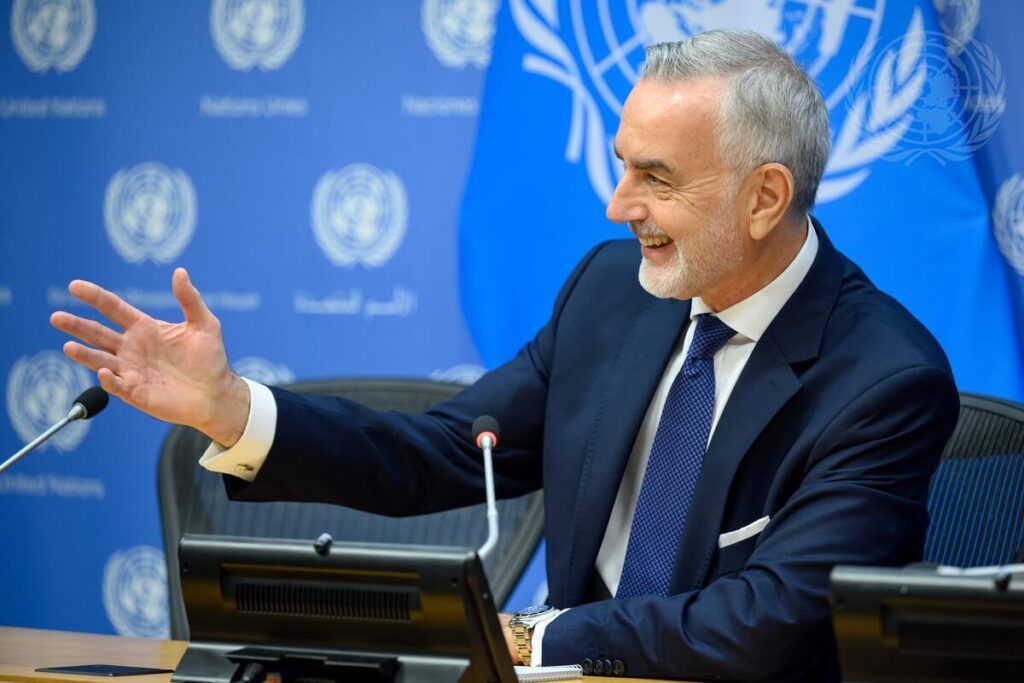How to redefine “success” in upcoming nuclear nonproliferation talks
By Sanaa Alvira | July 14, 2023
 Gustavo Zlauvinen, President of the Review Conference for the Nuclear Non-Proliferation Treaty (NPT), briefs reporters after the opening of the 2022 Review Conference. Credit: UN Photo/Loey Felipe
Gustavo Zlauvinen, President of the Review Conference for the Nuclear Non-Proliferation Treaty (NPT), briefs reporters after the opening of the 2022 Review Conference. Credit: UN Photo/Loey Felipe
The eleventh Review Conference of the Nuclear Non-Proliferation Treaty (NPT) is scheduled for 2026, and the first session of its Preparatory Committee is set to take place this month in Vienna. As they did last year, state parties will once again convene for the NPT meeting under the cloud of Russia’s war in Ukraine. Last month’s breach of the Kakhovka dam on the Dnipro River has taken the war into “uncharted territory,” further exacerbating global tensions.
Last August, those strained tensions prevented the NPT Review Conference from producing a final document, marking the first time in history that two consecutive such conferences failed to reach consensus. The absence of a consensus document—usually seen as an indicator of success—highlighted growing concerns not only for the nonproliferation regime but also for the safety and security of civil nuclear facilities during armed conflict. Russia’s opposition to the summary document’s language on the Zaporizhzhia nuclear power plant, which remains under Russian military occupation, was responsible for the failure to achieve consensus in 2022.
The deteriorating security environment and worsening of relations between the West and Russia make it unlikely there will be a “successful” Review Conference in the foreseeable future. Indeed, the current stand-off raises questions about the future of the NPT review process and of multilateral consensus-based institutions. With little time to reflect on lessons learned before the next review cycle, it’s imperative to take stock of the situation quickly and set expectations realistically.
While 2026 is still a few years away, the first Preparatory Committee meets in less than a month, and action must be taken now to avoid another failure at the next Review Conference. The new review cycle would do well to broaden the scope of what success really means and to move away from the idea that success is equal to just a consensus final document. Redefining success is an essential first step to protect the consensus-based NPT review process from falling into stagnation or disarray. It would also be worthwhile to consider creating a subsidiary body with a special focus on the Zaporizhzhia nuclear power plant.
This does not mean a consensus final document is insignificant. It is still the ideal outcome, because it would be a tangible demonstration of agreement among member states and their commitment to the NPT objectives. But focusing too heavily on a final document means overlooking other crucial aspects of success, such as substantive discussions and negotiations between state parties and engagement with civil society.
Old is new. Broadening the scope of success is not a new suggestion. Henrik Salander, Sweden’s former Ambassador to the Geneva Conference on Disarmament, wrote in 2015 that perceiving a conference ending without a final document as an outright failure is an “exaggeration.” A 2017 policy brief by the Dutch institute Clingendael offered suggestions for an outcome placing less emphasis on a final document. More recently, a 2021 report by the Nuclear Threat Initiative presented recommendations to the 2022 NPT Review Conference, suggesting that success should not be confined to a final document.
Several countries, including the United States and the United Kingdom, emphasized during the last Review Conference that member states “agree on more than we disagree” and that Russia’s opposition to the final document should not diminish the extensive work accomplished at the conference. “It is like we had a movie for four weeks, but we couldn’t take a picture at the end of the movie,” said Ambassador Gustavo Zlauvinen of Argentina, who presided over the conference. “So not having the picture of that doesn’t reflect that the movie didn’t exist.”
The glass is half empty. There are several reasons why a Review Conference with a final consensus document in 2026 seems unlikely. In January Russia said its relations with the United States were at an all-time low. The following month, Russia suspended its participation in the New START Treaty, the last bilateral nuclear arms control treaty in force. Adding to the strain, Russia recently notified state parties of its decision to withdraw from the Treaty on the Conventional Forces in Europe on November 7, 2023. Furthermore, Russia is planning to start deploying tactical nuclear weapons in Belarus as soon as this month, not only signifying a worsening of the US-Russia relationship but also underscoring growing challenges in the realm of arms control.
Meanwhile, Iran and the West continue to clash over the country’s nuclear program. The United Kingdom, Germany, and France have escalated their concerns over the presence of uranium particles enriched at 83.7 percent—which they say is inconsistent with Iran’s declared level of enrichment—as well as the incomplete measures taken by Iran to facilitate further verification activities.
China continues to criticize the AUKUS deal—a trilateral security pact involving the United States, the United Kingdom, and Australia. China called the deal “a product of Cold War mentality and camp-based confrontation” at a June 2023 meeting convened by the International Atomic Energy Agency.
The list goes on.
This isn’t the first time the NPT regime has suffered major strain and still managed to prevail with a consensus final document (2010 being the latest example, although consensus was not reached in the review portion that reflected the views of the conference president). What’s different now is that there may be a temptation among state parties to push harder for a final document, no matter how watered-down and hollow it is, to demonstrate that a “successful” conference is still possible. Such an outcome is contrary to the spirit of a Review Conference and effectively disregards any attempts to address the critical challenges currently facing the NPT regime. This approach runs the risk of a fatal three-peat and carries the potential to undermine the relevance of the NPT itself. It is simply not worth “waiting and seeing” how the consequences of such an outcome would unfold.
Redefining success. At this critical juncture, the next review cycle is an opportunity to demonstrate the NPT’s relevance and resilience—and adapt to the changing security environment—by directly addressing some of the challenges. It is crucial to engage in serious conversations that explore alternative measures of success, and to prioritize open dialogue to ensure the NPT review process remains relevant and effective.
The upcoming Preparatory Committee in Vienna should consider agreeing to the establishment of a subsidiary body to begin a review of the lessons learned from the attacks on Ukraine’s Zaporizhzhia nuclear plant and to help the international community to prepare for and respond to future events and anticipate new threats. A separate body will allow for more focused discussions of the Zaporizhzhia nuclear plant, given the disagreements over Zaporizhzhia that prevented the last Review Conference from producing a final document.
If this subsidiary body manages to hold extensive discussions and negotiations, identify potential areas of agreement, and help lay the groundwork for consensus on key issues during the broader Review Conference, then the Review Conference should be seen as successful, irrespective of the exact language that makes it to the final document.
More broadly, the upcoming Preparatory Committee should collectively agree to raise the position of the Chair of the Review Conference. If there are several high-level political declarations and tangible commitments made by state parties reaffirming their pursuit of the core principles of the NPT, then the Chair can be tasked with producing a report reflecting this. It should be agreed upon before the 2026 Review Conference (for legitimacy) that the issuance of such a report by the Chair would be seen as a success, regardless of whether the declarations or commitments in the report make it into the final document. This may also incentivize state parties to come up with concrete statements. While pursuing a consensus final document should still be the goal, the Preparatory Committee should broadly agree that multiple documents reflecting consensus on specific issues and differences in others would be a successful outcome for the Review Conference in 2026.
The Preparatory Committee itself need not achieve consensus on an outcome document. Instead, the Chair can present a summary reflecting the discussions that took place. This presents a suitable opportunity for state parties to have an open and honest discussion without worrying about what language they would need to agree upon in any final document.
The first Preparatory Committee typically sets the agenda for the review cycle: deciding dates for future meetings, and discussing procedures and arrangements for the review cycle. A timely and urgent recognition by delegations of the need to explore flexible forms of consensus must therefore happen during this first meeting, and any text coming out of the meeting should reflect this.
This Preparatory Committee is unique for its establishment of a dedicated working group aimed at improving the effectiveness and efficiency of the NPT review cycle. Delegations should take advantage of this forum to engage in discussions on this matter.
Deepti Choubey, the former deputy director of the Nuclear Policy Program at Carnegie Endowment, writes that “defining failure is the first step for defining success.” So, while understanding and agreeing that a successful conference can take many forms, the Preparatory Committee would be served well to decide what would constitute a failed conference. If the upcoming Preparatory Committee can collectively agree that a failed conference is one that fails to produce tangible commitments to disarmament and nonproliferation principles, and resorts to a one-size-fits-all consensus document characterized by a lack of genuine efforts to negotiate and compromise in good faith, then the first step to success has already been taken.
Together, we make the world safer.
The Bulletin elevates expert voices above the noise. But as an independent nonprofit organization, our operations depend on the support of readers like you. Help us continue to deliver quality journalism that holds leaders accountable. Your support of our work at any level is important. In return, we promise our coverage will be understandable, influential, vigilant, solution-oriented, and fair-minded. Together we can make a difference.















I wish the Vienna negotiators good luck, but respectfully suggest that the NPT enterprise will continue to erode if it doesn’t address the basic contradictions built into its assumption that peaceful nuclear energy is essential and economical (and, nowadays, vital for climate protection). Now that the marketplace has decisively invalidated this assumption, Article IV can be reinterpreted to focus on its purpose, not its outmoded means, and then an internally consistent nonproliferation regime becomes possible. Details are in https://rmi.org/wp-content/uploads/2017/05/RMI_Document_Repository_Public-Reprts_Nuclear-Power-and-Nuclear-Bombs-Foreign-Affairs.pdf (1980) and https://rmi.org/insight/on-proliferation-climate-and-oil-solving-for-pattern/ (2010). Today the case is immeasurably stronger. We cannot have effective nonproliferation until people who understand the modern energy… Read more »